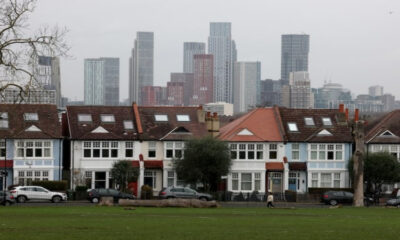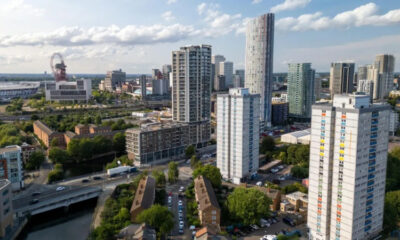Latest News
London’s Housing Crisis Deepens Despite Policy Interventions

London continues to grapple with an escalating housing crisis that has defied years of government policies and local reforms. Despite multiple initiatives aimed at increasing affordability, new data shows that property prices and rental costs remain among the highest in Europe. The situation has become a defining social and economic issue for the capital, affecting not only low-income households but also middle-class families who find themselves increasingly priced out of the city they call home. The growing mismatch between wages and housing costs has sparked renewed debate over the effectiveness of current strategies and the need for a more ambitious reform agenda.
The city’s housing market has long been characterized by chronic undersupply, speculative investment, and uneven development. While policymakers have introduced measures to encourage construction and expand affordable housing, the demand for homes continues to far exceed supply. As a result, the gap between average income and property costs has widened dramatically. Experts warn that without decisive action, London risks entrenching inequality and undermining its competitiveness as a global business and cultural center.
Rising Prices and Stagnant Wages
According to recent reports from property analysts, the average price of a home in London has climbed to more than ten times the median household income. This ratio is one of the most extreme in the United Kingdom, reflecting years of rapid appreciation driven by population growth and limited land availability. Rental costs have also surged, with tenants spending up to half their monthly income on housing. The shortage of affordable units has forced many families to relocate to outer boroughs or surrounding counties, leading to longer commutes and added pressure on public transportation.
Wage growth has not kept pace with rising housing costs. Despite modest improvements in earnings, inflation and increased living expenses have eroded real incomes. Young professionals face particular challenges, with many unable to save for deposits or secure mortgages under stricter lending criteria. The result is a growing reliance on the private rental sector, where competition for limited properties fuels further price increases. Housing charities report a rise in overcrowding and temporary accommodation, especially among lower-income households.
Government interventions have aimed to address these disparities through initiatives such as shared ownership schemes and subsidies for first-time buyers. However, critics argue that these policies have done little to curb the underlying issue of inadequate supply. Construction rates remain well below official targets, and planning regulations continue to slow down development projects. Developers also face rising costs for materials and labor, further constraining the pace of new construction.
Policy Challenges and Urban Development
City authorities have acknowledged the need for bold and coordinated action. The Mayor of London’s office has outlined plans to accelerate affordable housing construction and introduce incentives for developers to prioritize social housing units. Yet the complexity of urban development in London makes progress difficult. Land scarcity, local opposition to high-density projects, and bureaucratic delays often stall proposed developments before they break ground.
Experts in urban economics argue that the problem is not simply one of supply but of balance. Much of the new construction in central London caters to luxury markets and foreign investors, leaving limited availability for local residents. The concentration of high-end developments has contributed to rising land values, making it even harder for affordable housing projects to compete. Calls for stricter regulation on speculative investment and the repurposing of vacant properties have grown louder as policymakers search for solutions.
Sustainability has also become a critical component of the housing debate. The push for environmentally friendly construction methods and energy-efficient homes adds complexity to an already expensive market. While these initiatives are essential for long-term urban resilience, they often raise costs in the short term. Balancing environmental goals with affordability remains one of the central challenges facing housing planners.
Social Impact and Long-Term Outlook
The consequences of London’s housing crisis extend beyond economics. Rising housing insecurity has deep social implications, influencing health, education, and community stability. Families forced into temporary accommodation face disruption in schooling and employment, while younger residents increasingly view homeownership as an unattainable dream. The city’s cultural fabric, historically defined by its diversity, risks being eroded as artists, educators, and essential workers move elsewhere in search of affordability.
Business leaders have also raised concerns about the long-term impact on the city’s competitiveness. High living costs make it harder to attract and retain skilled professionals, potentially pushing companies to relocate operations. Urban planners warn that without meaningful intervention, London could face a future of declining inclusivity and widening economic inequality.
Despite these challenges, there are reasons for cautious optimism. Recent collaborations between the public and private sectors have yielded innovative housing models, including modular construction and community land trusts. These approaches aim to reduce costs and create sustainable, locally managed developments. Policymakers continue to explore how digital technology and streamlined regulations can accelerate planning approvals and increase transparency in land use.
Conclusion
London’s housing crisis remains one of the most pressing challenges facing the city today. While policy interventions have provided limited relief, they have yet to address the structural issues driving unaffordability. A lasting solution will require not only greater investment in affordable housing but also systemic reform of planning and development frameworks.
As London looks to the future, balancing growth with inclusivity will define its success. Ensuring that people from all backgrounds can live and work in the city is essential to maintaining its role as a global capital of opportunity and culture. The challenge is immense, but the urgency to act has never been clearer.






















